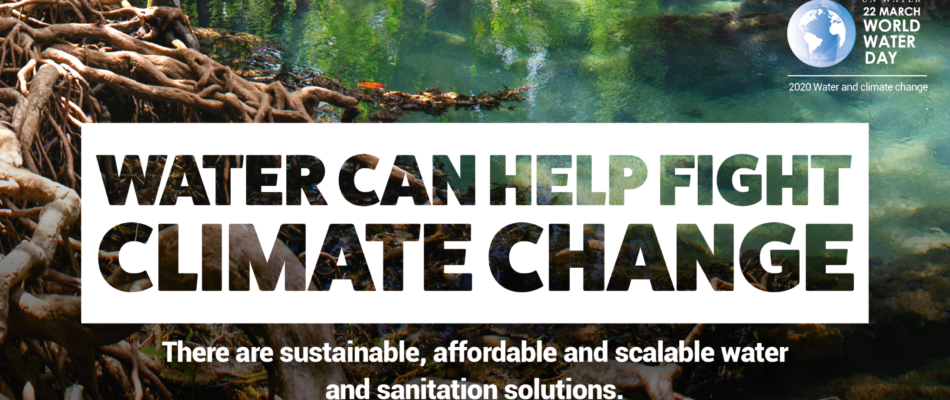
World Water Day 2020: We cannot afford to wait
World Water Day celebrates water and raises awareness of the 2.2 billion people living without access to safe water. It is about taking action to tackle the global water crisis. A core focus of World Water Day is to support the achievement of Sustainable Development Goal 6: water and sanitation for all by 2030.
World Water Day 2020 is about water and climate change – and how the two are inextricably linked. By adapting to the water effects of climate change, we will protect health and save lives. And, by using water more efficiently, we will reduce greenhouse gases.
We cannot afford to wait. Climate policymakers must put water at the heart of action plans
- Acting now. Uncertainty about the future cannot be an excuse for inaction today; if the world is to limit global temperature increases to well below 2°C, we must act immediately.
- Considering water as part of the solution. Improved water management is an essential component of successful climate mitigation and adaptation strategies.
- Improving water management practices can help increase climate resilience, improve ecosystem health, and reduce the risk of water-related disasters.
- Ensuring transboundary cooperation in adaptation is needed to address climate impacts that cross national boundaries and to improve regional cooperation.
- Rethinking financing. Climate finance for water resource management supports community climate resilience, job creation and helps to improve sustainable development outcomes.
Water can help fight climate change. There are sustainable, affordable and scalable water and sanitation solutions
- Improving carbon storage. Peatlands cover about 3% of the world’s land surface but store at least twice as much carbon as all of Earth’s forests. Mangrove soils can sequester up to three or four times more carbon than terrestrial soils. Protecting and expanding these types of environments can have a major impact on climate change.
- Protecting natural buffers. Coastal mangroves and wetlands are effective and inexpensive natural barriers to flooding, extreme weather events and erosion.
- Harvesting rainwater. Rainwater capture is particularly useful in regions with uneven rainfall distribution to build resilience to shocks and ensure supplies for dry periods.
- Adopting climate-smart agriculture. Practising conservation agriculture to improve soil organic matter (needed for the soil to retain water), reducing post-harvest losses and food waste, and transforming waste into a source of nutrients or biofuels/biogas can address both food security and climate change.
- Reusing wastewater. Unconventional water resources, such as regulated treated wastewater, can be used for irrigation and industrial and municipal purposes.
Everyone has a role to play. It is surprising how many water actions anyone, anywhere can take to address climate change
Hundreds of thousands of people are taking individual action on climate change as part of the UN’s #ActNow campaign. Here are five changes we can all make today:
- Take five-minute showers: Water scarcity already affects four out of ten people. With 80% of wastewater never being treated, taking shorter showers is a great way to save this precious resource.
- Eat more plant-based meals: Dietary changes, featuring plant-based foods and sustainable animal-sourced food, could reduce greenhouse gas emissions by up to 8.0 gigatonnes a year of carbon dioxide equivalent.
- Don’t throw away edible food: An estimated 1/3 of all food produced globally is lost or goes to waste. Reducing your food wastage reduces demand on agriculture which is one of the biggest water consumers.
- Turn off tech: Currently, 90% of power generation is water-intensive. By powering down our devices when we’re not using them, the less energy needs to be produced.
- Shop sustainably: A typical pair of jeans takes 10,000 litres of water to produce, equal to what a person drinks in 10 years. Sourcing our goods from responsible sources can have a big impact on the consumption of water and other essential resources.
